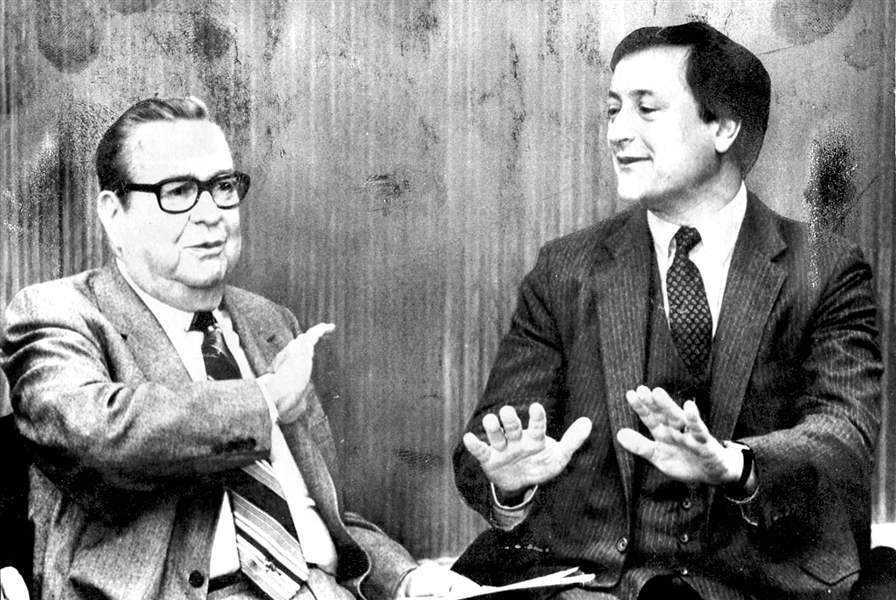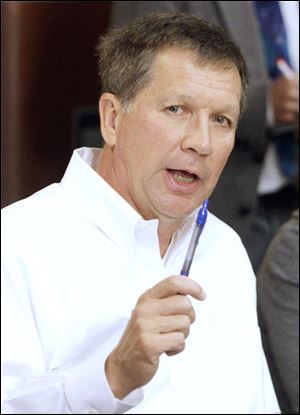
'10 sweep puts GOP in spot of '82 Dems
11/14/2010
ASSOCIATED PRESS Outgoing Gov. James Rhodes, left, and Gov.-elect Dick Celeste addressed reporters in November, 1982, after the Democrats gained control of the Statehouse and the governor's mansion. The party lost control of the Senate in 1984.

ASSOCIATED PRESS Gov.-elect John Kasich has put the brakes on Strickland appointments including for the university boards and the Casino Control Commission.
COLUMBUS - It was a year of recession, high unemployment, and state budget problems. Frustrated Ohioans opted for wholesale change, handing the keys of government to a single political party intent on pursuing new tax policies and other initiatives.
But it wasn't 2010, when Republicans were elected to the governor's mansion and to majorities in both the Ohio House and Senate.
It was 1982, the last time voters gave Democrats sweeping control of state government.
It was short-lived. After making a "temporary" income-tax increase permanent, adding to it, and enacting a far-reaching collective-bargaining law for teachers and public employees, Democrats lost their tenuous control of the
"Democrats controlled everything. They did whatever they wanted. After all, they won the election," said state Rep. Louis Blessing (R., Cincinnati), who first joined the House in 1983. "They kind of just ignored us."
In 1982, voters elected Dick Celeste as governor with 59 percent of the vote, and he brought narrow control of the Ohio Senate with him to add to what was already a long-running Democratic reign in the House under powerful Speaker Vern Riffe.
While Democrats quickly acted on their own ideas about how to deal with taxes, spending, and organized labor, they were in no position to disrupt the actions of Republican Gov. Jim Rhodes in his final two months before Mr. Celeste took office.
Today, the Republican Senate is slamming the brakes on confirmation of numerous appointments made by Democratic Gov. Ted Strickland that were left lingering during the months that the chamber was on an extended summer and election recess.

ASSOCIATED PRESS Outgoing Gov. James Rhodes, left, and Gov.-elect Dick Celeste addressed reporters in November, 1982, after the Democrats gained control of the Statehouse and the governor's mansion. The party lost control of the Senate in 1984.
That will give Republican Gov.-elect John Kasich the chance to put his own brand on those positions, which include college and university trustees and the new Ohio Casino Control Commission.
Because Republicans controlled the Senate in the last two months of 1982, there was no opportunity for the incoming Celeste administration to do something similar to the outgoing Mr. Rhodes.
The new Democratic administration did represent a sea change in Ohio politics. Inheriting a bad economy and budget deficit, Mr. Celeste and legislative Democrats were able to unilaterally enact what critics would later characterize as a 90 percent hike in the income tax.
They made permanent a 50 percent "temporary" surcharge put in place by Mr. Rhodes and then added 40 percent to it. Along with it came increased spending for schools and other programs.
"One of the things that happen when you take over total control of all three branches is that your constituency base expects more out of you," said Rep. Vernon Sykes (D., Akron).
He was part of the 1983 freshman class in the House and is currently the outgoing chairman of the powerful House Finance and Appropriations Committee.
"You have that mandate to deliver some things," Mr. Sykes said. "You also have a total responsibility to govern. You can't really blame anyone else. It's a major challenge because you don't have the other party to kind of keep you moderate.
"As Democrats, we had a tendency to be more liberal as, I'm sure, the Republicans, with the Tea Partiers and so forth, will be under a lot of stress to be more conservative," he said. But while Democrats may have paid a political price for the tax and collective bargaining decisions, Mr. Sykes said he still believes they were the right decisions.
Democratic control of the House would continue for another decade, and Mr. Celeste went on to win re-election in 1986, foiling an attempted comeback by Mr. Rhodes. But Democrats have never again enjoyed simultaneous control of the governor's office, House, and Senate.
In addition to undoing several Strickland appointments, Mr. Kasich has asked Mr. Strickland to halt studies of proposed restoration of passenger rail service between Cincinnati, Dayton, Columbus, and Cleveland.
That project is to be funded by $400 million in federal stimulus funds. He's also vowed to undo many of the mandates included in Mr. Strickland's long-term K-12 education reforms.
Rep. Ron Amstutz (R., Wooster), who will be chairman of the House Finance and Appropriations Committee next year, was in the House at the time of the Celeste-Democratic takeover. Then came the tax vote.
"That was when things started to get a little rough in terms of working together," he said.
"Then the collective bargaining piece came through pretty quickly … There was a lot of debate on that. I was a mayor [of Orrville] when that almost passed under the Rhodes administration. This was not a concept that came out of the chute as a fresh proposal, but it had a different calibration under the dynamics of the House, Senate, and governor."
Rep. Randy Gardner (R., Bowling Green) first arrived in the Ohio House in Columbus in 1985 when Republicans were reasserting themselves, although it would be another decade before the GOP regained the House. "My relationship with Celeste was a vigorous, good debate on a special committee to appropriate public preschool money," he said.
"The governor actually served on the committee. I was in my second term in the legislature sitting on committee with the governor himself in the committee room. … It was significant for a fairly young legislator to sit with the governor and discuss policy."
Contact Jim Provance at:
jprovance@theblade.com
or 614-221-0496.